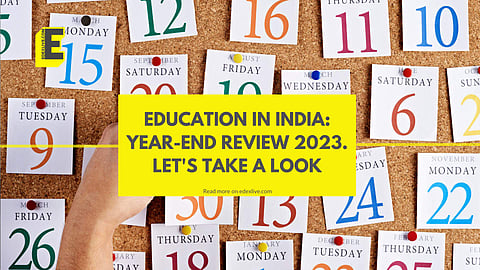

The year 2023 proved to be a pivotal year for education in India, marked by significant strides and ongoing challenges. The year witnessed the continued implementation of the National Education Policy (NEP) 2020, bringing about a paradigm shift in the educational landscape.
Key developments
- NEP 2020 implementation: Rolling out NEP's bold reforms, several states introduced multiple entry and exit options in higher education, flexible credit systems, and multidisciplinary courses. Notably, the Common Universities Entrance Test (CUET) was launched, aiming to streamline college admissions.
- Focus on education in mother tongue: NEP's emphasis on mother tongue education gained momentum, with states like Karnataka and Tamil Nadu introducing engineering and medical courses in local languages. This initiative aims to promote inclusivity and accessibility for students from diverse backgrounds.
- Digital divide bridged: The pandemic highlighted the digital divide in education. Recognising this, the government launched various initiatives like PM eVIDYA and DIKSHA, providing online learning resources and digital infrastructure to bridge the gap.
- Skilling and upskilling: Recognising the need for a skilled workforce, the government focused on promoting skilling and upskilling initiatives. The National Skill Development Mission (NSDM) and Pradhan Mantri Kaushal Vikas Yojana (PMKVY) played key roles in providing skill training to millions of individuals.
- Focus on research and innovation: Emphasizing research and innovation, the government launched various initiatives like the National Research Foundation (NRF) and the Innovation Cell at the All India Council for Technical Education (AICTE). These initiatives aim to foster a culture of research and innovation in the education sector.
Challenges remain
Despite the progress made, challenges remain. The learning gap caused by the pandemic continues to impact students, particularly those from disadvantaged backgrounds. Teacher training and capacity building need further attention to ensure effective implementation of the NEP.
Additionally, addressing issues like gender disparity, access to quality education in rural areas, and the need for increased investment in education are crucial for achieving the vision of equitable and inclusive education for all.
For 2024, the education sector in India stands at a crossroads. Continued implementation of the NEP, addressing existing challenges, and focusing on emerging trends like digital learning and personalised education will be key to shaping a future where education empowers every individual to reach their full potential.
